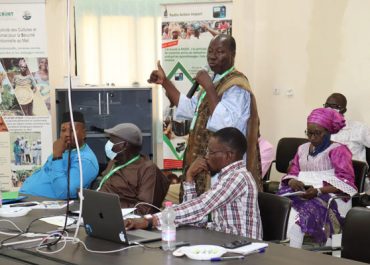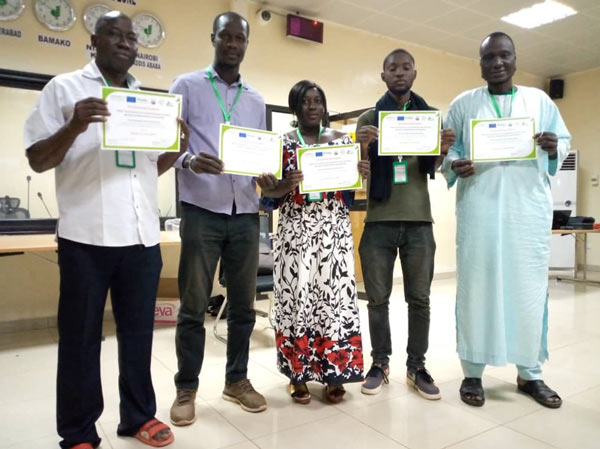Radio is helping the agriculture sector to boost technology transfer and development. From all the mass media means channels of communication, radio is the most important. It helps in communicating useful information on using improved agricultural technologies which are critical for the development of the rural farmers.
Recently, FOSCAR Mali in partnership with five researchers from the International Crops Research Institute for the Semi-Arid Tropics (ICRISAT) and the Institut d’économie rurale au Mali (IER), conducted capacity building workshop on the effective use of radio to communicate and disseminate technology transfer.
The event was attend by 27 participants including local correspondents representing four community radios in Mali, five representatives of farmers’ organizations, three extension workers, agropreneur, specialist in GIS. The participants came together to build their knowledge and skills on using radio for gathering and reporting news on the latest technologies in agriculture.

The need for actors in agriculture to be equipped with technical knowledge on how to make a great radio packages as a move to encourage agricultural technology transfer is now recognized among scientists, food security experts, extension workers and representative of farmer’s organizations.
The training focused on strengthening the capacities of radio stations, extension workers, researchers and producers on the techniques of impactful and intelligent Participatory Radio. The workshop was conducted after two years of the outreach programme supporting innovations and best practices shared with some 40,000 farmers.
The purpose of the outreach was to increase the number of participating farmers by 4% and contribute to “increasing crop productivity and reduce negative impacts of climate change on the food and nutrition security in Mali”.
 The “Forum des Services de Conseil Agricole et Rural du Mali” (FOSCAR-Mali) that hosted by Radio Action Impact has expertise in communicating agriculture subjects through radio Action Impact integrating stakeholder mapping, participatory video and social media (Facebook, Whatsapp, and YouTube). In addition, the FOSCAR-Mali is able to Identifying innovative digital agricultural advisory approaches that can support the consolidation of the adoption by producers through the dissemination of messages on good practice by partner radio stations at ICRISAT.
The “Forum des Services de Conseil Agricole et Rural du Mali” (FOSCAR-Mali) that hosted by Radio Action Impact has expertise in communicating agriculture subjects through radio Action Impact integrating stakeholder mapping, participatory video and social media (Facebook, Whatsapp, and YouTube). In addition, the FOSCAR-Mali is able to Identifying innovative digital agricultural advisory approaches that can support the consolidation of the adoption by producers through the dissemination of messages on good practice by partner radio stations at ICRISAT.
The Forum has the capacity to train participants in the development and the production of key messages and participatory broadcasts on selected technologies intended for social media. It can also provide training on the techniques and processes of setting up Community Auditors ‘Clubs to encourage audience participation in radio programming.
Key training highlights:
The radio training on agricultural technology transfer towards improved farming practices and innovations has led to the promotion of new varieties of sorghum, millet, cowpeas and peanuts developed for their ecological and nutritional characteristics and well as the Smart Food and nutrition in the EU-APSAN-Mali project. Furthermore, the training has facilitated a participatory media approach of impact on agricultural issues and promoted community auditors’ clubs and indicator management while strengthening the networking between the actors of the programme.
According, to Dr Mamoutou Kouressy, Researcher, IER Project Coordinator while the training was the first for him and other participants it was an eye opener and useful.
“This was my first experience to participate in this kind of training workshop,” said Dr. Kouressy. “The participants’ knowledge has improved on the different approaches and technologies.”
Training results
Adama Sanogo, Director of Radio a de Bla noted that through the training participants have skills in developing agricultural programme messages focused on good practices.
“Participants have knowledge of the mechanism for setting up CACs and their contribution to the management of project indicators, and radio networking with a scientific approach. We will be available for the implementation of the approaches given during the training. “
“With the knowledge acquired during this training, and the support for radios in their implementation, I can assure the Director General of ICRISAT that we will exceed the indicators of 40,000 targeted producers,”Sanogo said.

